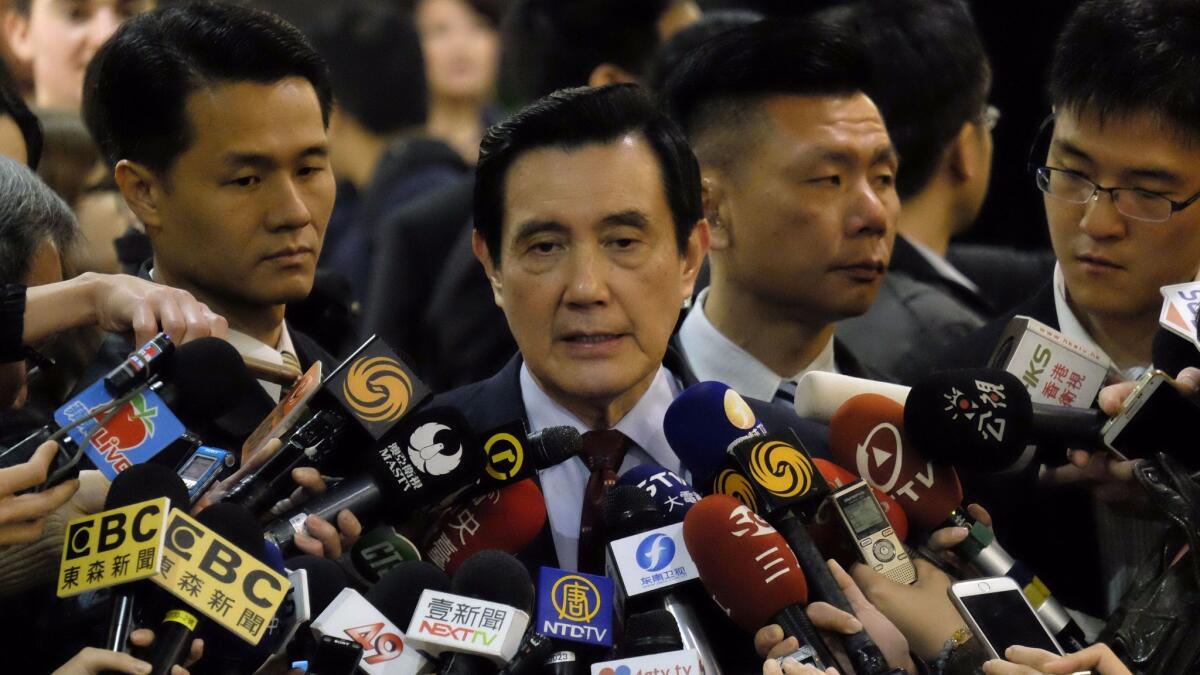Former Taiwan president charged with leaking secret information from corruption inquiry

- Share via
Reporting from TAIPEI, Taiwan — Former Taiwanese President Ma Ying-jeou was charged Tuesday with aiding the release of private information in a wiretap case involving suspected influence peddling by legislators.
The case against Ma puts the former leader — controversial for his China-friendly policies but widely believed to be a strict follower of the law — under a new spotlight and raises questions about progress in the vibrant democracy of 30 years.
The Taipei District Public Prosecutor’s Office charged Ma with breaking laws on protection of personal information, release of secrets and communication security and surveillance, office spokesman Chang Chieh-chin said. A conviction could carry up to three years in prison.
Ma, who served as president from 2008 to 2016, has said he is innocent.
The prosecutor’s spokesman said that once in August 2013 and again the following month, Ma gave information from a wiretap to his premier at the time, Jiang Yi-huah.
Former government prosecutor Huang Shyh-ming had authorized the wiretap to investigate attempts to influence justice officials by the former president of parliament, Wang Jin-pyng, on behalf of senior legislator Ker Chien-ming, government media in Taiwan reported at the time.
Ker, a senior Democratic Progressive Party lawmaker, was fighting a separate criminal case and eventually was found not guilty. Ker has sued Ma over alleged leaks of confidential information independent of the prosecutor’s inquiry, and his case is still in court.
Wang and Ma, though members of the same party, have jousted with each other for power.
Ma rejected the charges Tuesday. While questioning him during the six-month inquiry, the prosecutor did not want to hear the former president’s full explanation of his role in the case, Ma spokeswoman Hsu Chao-hsin said.
“There’s no way he should have been charged,” she said. “Where is the justice?”
Ma told reporters Tuesday that to pass on information about suspected influence peddling to his premier was a way to handle “crisis management” and violated no laws. He vowed to fight the case. “I’m confident in my innocence,” he said.
The now-retired government prosecutor suspected of approving the wiretap was found guilty two years ago and paid a fine.
Ma campaigned for office in 2008 on rule of law as his predecessor, former President Chen Shui-bian, was suspected of graft during his own eight-year term. Chen received a 20-year sentence and received medical parole in 2015.
In 2011, Ma’s government established an anticorruption agency under the Justice Ministry.
He stepped down last year because of term limits, but his Nationalist Party lost the presidential election as well as its legislative majority to the Democratic Progressive Party, which takes a more guarded view of China, in line with the fears of many of Taiwan’s people.
The charges filed Tuesday shed new light on Ma, said Shane Lee, a political scientist at Chang Jung Christian University in Taiwan. “It’s just the opposite of what he was believed to be, at least by some people,” Lee said.
Ma, 66, a U.S.-educated law scholar and former justice minister, also built a reputation for setting aside 60 years of political hostility between Taiwan and its more militarily powerful neighbor China to discuss trade and investment issues.
But in 2014, after China and Taiwan had signed more than 20 deals, a backlash to Ma’s deepening engagement with Beijing prompted nearly a month of street protests by Taiwanese fearful of getting too close to a historic rival. The protest movement contributed to the Nationalist Party’s local election losses that year, as well as its defeat in the 2016 presidential race.
China considers self-ruled Taiwan a renegade province and insists on eventual unification of the island and mainland. Surveys in Taiwan show a majority prefer self-rule.
Ma’s legal case following the fate of his predecessor raises questions about the maturity of Taiwan’s democracy that started in 1987 with the end of martial law, some experts say.
Some of Ma’s supporters say the inquiry was politically motivated, conducted under the government of a party long hostile to the Nationalists. Chen alleged the same during his graft case proceedings. Chen was backed by the Democratic Progressive Party and charged after the Nationalists took office.
“If we blur the lines between politics and law, we are traveling down a very slippery slope,” said Joanna Lei, chief executive officer of the Chunghua 21st Century think tank in Taiwan. “Taiwan has prided itself as a model democracy and that would soon be challenged.”
Political figures in Taiwan can sometimes get the attention of prosecutors to hurt rivals even if no laws were obviously violated, Lee said. “It’s a very fine line between politics and law,” he said.
Jennings is a special correspondent.
More to Read
Sign up for Essential California
The most important California stories and recommendations in your inbox every morning.
You may occasionally receive promotional content from the Los Angeles Times.










